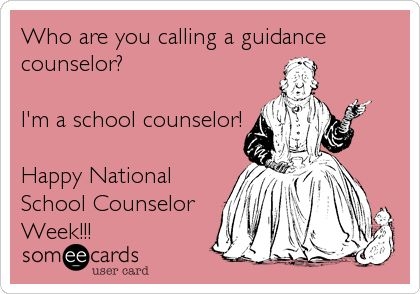Editor’s note: In recognition of National School Counseling Week, today’s blog post is written by a former school counselor and the author of The Body Image Workbook for Teens, Julia V. Taylor, MA.
I worked as a school counselor for ten years before beginning a PhD program in Counselor Education. Throughout my career, I was constantly asked, "What do you do all day?" Friends, family, parents, teachers, students, and sometimes even administrators are confused by the current role of the school counselor. In honor of National School Counseling Week, which is from February 2—6, I'd like to write about what professional school counselors really do all day.
What do you remember about your school counselor? Did they change your schedule, give you advice about postsecondary options, help you with a personal concern? I have heard everything from “I think my counselor changed my schedule” to “My school counselor was awful” to “I had the best school counselor ever!” A lot of these responses depend on when you graduated from high school, as the field has evolved significantly over the past decade.
Currently, all professional school counselors hold master’s degrees, and many have additional licenses, certificates, or specialty endorsements. The field of school counseling operates under the framework of the American School Counselors Association (ASCA) National Model (2012), which outlines the specific components of a comprehensive school counseling program. First introduced in 2003, the model was designed for school counselors to provide comprehensive services to all students.
A comprehensive school counseling program is data-driven and rooted in standards in academic, post-secondary, and social and emotional development. The ASCA National Model is designed to help school counselors
-
ensure equitable access to a rigorous education for all students;
-
identify the knowledge and skills that all students will acquire as a result of the K—12 comprehensive school counseling program;
-
be delivered to all students in a systematic fashion; and
-
ensure data-driven decision making.
So, what does this mean? It means that school counselors wear many hats. They visit classrooms, do individual and group counseling, help students with postsecondary planning, serve on leadership teams, and help parents. Our services extend to the whole school and school community, instead of just a few students. And at the end of the day, school counselors provide whatever support is necessary in order to help students graduate. A school counselor’s ultimate responsibility is to help students become “productive, well-adjusted adults of tomorrow” (ASCA, n.d.). They are a valuable resource for the entire school community.
If you have a child in a K—12 school, or work in a school setting, please take a few minutes to recognize your school counselor during National School Counseling Week. A quick email or note to thank them for all they do goes a long way.
Learn more about the role of the school counselor by visiting The American School Counselor Association.
Follow Julia Taylor on Twitter @juliavtaylor.
References
American School Counselor Association. (2012). The ASCA national model: A framework for school counseling programs (3rd ed.). Alexandria, VA: Author. American School Counselor Association. (n.d.). Careers/roles. Retrieved from http://www.schoolcounselor.org/school-counselors-members/careers-roles


 2024 Peace Playbook: 3 Tactics to Avoid Clashes with Your Partner
2024 Peace Playbook: 3 Tactics to Avoid Clashes with Your Partner